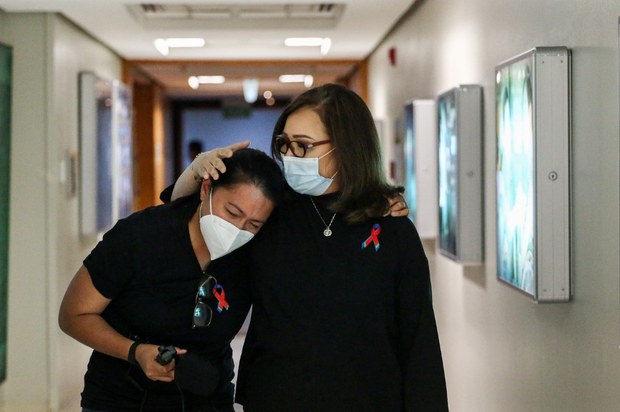Philippine Congress Votes to Keep Largest Broadcaster off Air
2020.07.10
Manila and Bacolod, Philippines
 Cory Vidanes (right), the chief operating officer of ABS-CBN Corp., comforts reporter Chiara Zambrano at the Philippine network’s headquarters in Quezon City, Metro Manila, after a congressional committee voted to reject the renewal of a 25-year license for the broadcaster, July 10, 2020.
Cory Vidanes (right), the chief operating officer of ABS-CBN Corp., comforts reporter Chiara Zambrano at the Philippine network’s headquarters in Quezon City, Metro Manila, after a congressional committee voted to reject the renewal of a 25-year license for the broadcaster, July 10, 2020.
The Philippine Congress on Friday rejected the renewal of a 25-year license for the ABS-CBN network, permanently blocking the country’s largest broadcaster from airing programs on its public channels, with critics deploring the move as another major blow to press freedom here.
Voting 70-11, the Committee on Legislative Franchises of the House of Representatives stopped the ABS-CBN Corp. from resuming operations, sending 11,000 of its employees jobless in the middle of a pandemic. The network, a source of critical news for Filipinos, has been a thorn for President Rodrigo Duterte and his administration.
“Today is a sad day for the entire ABS-CBN family and for the millions who are hoping for our return to air,” ABS-CBN chairman Mark Lopez said in a statement. “This is not the outcome we have hoped for, but we remain grateful that we were able to participate in the process and clear the issues raised against ABS-CBN.”
Committee Chairman Frank Alvarez announced the outcome of the vote.
“The resolution to deny ABS-CBS’s franchise renewal application is hereby adopted. Pursuant to Section 49 of the Rules of the House of Representatives, all House bills and House resolutions relative to the grant or renewal of the franchise application of ABS-CBN Corporation are hereby laid on the table,” he said.
Lawmakers allied with Duterte control the legislature.
Rep. Mike Defensor explained that “in parliamentary courtesy, when a bill is being approved, we don’t necessarily vote no because we just lay it on the table.”
“But technically for a franchise application, the effect would be to kill the application of the franchise,” Defensor said.
He and other lawmakers grilled the owner and managers of ABS-CBN during a 12-day hearing that started in June.
Duterte accepted the decision, spokesman Harry Roque said.
“The Palace has maintained a neutral stance on the issue as it respects the separation of powers between the two co-equal branches government,” Roque said in a statement. “Much as we want to work with the aforesaid media network, we have to abide by the resolution of the House committee.”
Vice President Leni Robredo, however, spoke out against the vote, ABS-CBN reported on its website.
“This decision has wide implications. This has a chilling effect: it’s not excessive to think that editorial choices of other news organizations might change because of the repression of ABS-CBN,” Robredo said.
“This takes away the livelihood of thousands of workers under the network’s employ, besides the contractual ones, and other industries that rely on the network’s projects. This curtails the proper flow of timely information.”
Meanwhile, New York-based Human Rights Watch (HRW) called the vote a “grievous assault on press freedom in the country.”
Phil Robertson, Deputy Asia director of HRW, said it was a dark day for the Philippines, which once was touted as “a bastion of press freedom and democracy” in Southeast Asia.
“Not since the dictator Ferdinand Marcos shut down ABS-CBN and other media outlets in 1972 has a single government act caused so much damage to media freedom. This move solidifies the tyranny of President Rodrigo Duterte who accused ABS-CBN of slights against him and politically targeted it for refusing to toe the government’s line and criticizing his so-called ‘war on drugs,’” Robertson said in a statement.
“Today’s vote to deny the franchise renewal is an astounding display of obsequious behavior by congressional representatives, kowtowing to Duterte by agreeing to seriously limit media freedom in the Philippines,” he said.
![200710-PH-network-inside.jpg ABS-CBN employees and others rally outside the network’s headquarters in Quezon City, Philippines, to protest a decision by Congress to cancel the broadcaster’s license, July 10, 2020. [Luis Liwanag/BenarNews]](/english/news/philippine/network-dark-07102020100559.html/200710-PH-network-inside.jpg/@@images/41efff9f-fc6d-4943-820d-b87b94b565dd.jpeg)
2016 election reporting
The network had angered Duterte after airing an unfavorable advertisement against him during campaigning for the 2016 presidential election.
ABS-CBN went off the air on May 5 after the National Telecommunications Commission ordered it to cease operations, reneging on a promise that the network would be allowed to operate pending its application for a franchise renewal.
ABS-CBN’s free radio and television channels and cable operations have been shut down and is operating online only even though state regulators repeatedly said it had no violations.
The Foreign Correspondents Association of the Philippines (FOCAP) condemned Friday’s decision as a “painful stab at press freedom.”
“The decision deprives the Filipino people of an independent source of information when millions are grappling with the coronavirus pandemic,” the group said.
“It obliterates the livelihood of thousands of journalists and media workers risk their lives each day to keep the public informed.”
The vote came less than a month after a Manila court on June 15 convicted veteran journalist Maria Ressa and former Rappler journalist Reynaldo Santos Jr. of cyber libel. Like the broadcast giant, Ressa and Rappler have been critical of the Duterte administration.
The case against them stemmed from a 2012 Rappler story that accused a businessman, Wilfred Keng, of lending a vehicle to the country’s Supreme Court chief justice and having links to the criminal underworld. The plaintiff in the complaint against Rappler, Keng, charged that the story had tarnished his image.
Ressa and Santos are out on bail while the case is on appeal.
Jeoffrey Maitem in Cotabato City, Philippines, contributed to this report.








